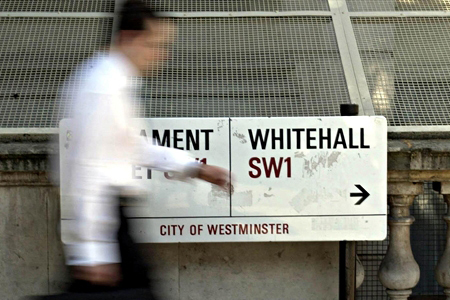Government bets on tech to cut £21 billion fraud
Francis Maude outlines plans to harness the power of technology to reduce the £21 billion of yearly losses to fraud in the public sector.


The Government has revealed plans to use various kinds of technology to tackle the 21 billion bill caused by fraud every year in the public sector.
Minister for the Cabinet Office Francis Maude outlined plans today to take forward proposals outlined in a report from the Counter Fraud Taskforce.
The Taskforce has carried out a number of pilots to cut fraud, which have already delivered savings of 12 million in just a few months, according to the Government.
Every pound defrauded from the Government means that there is less to spend on frontline services like healthcare, education, policing and defence.
One notable success was the use of data analytics to assess the likelihood of a tax application being fraudulent. This technique, used in a pilot between September 2010 and March 2011, provided 10.63 million of savings, according to the Cabinet Office.
To give people a nudge on paying tax, the Taskforce also sent text messages with reminders to those people more likely to miss payments.
The changes will form part of the Government's "zero-tolerance approach to tackling fraud," Maude said.
Get the ITPro daily newsletter
Sign up today and you will receive a free copy of our Future Focus 2025 report - the leading guidance on AI, cybersecurity and other IT challenges as per 700+ senior executives
"Every pound defrauded from the Government means that there is less to spend on frontline services like healthcare, education, policing and defence," he said.
"The Taskforce has made a good start and has already demonstrated that immediate cashable savings can be made from doing fairly simple common sense checks. Going forward we must take this further and work together to combat fraud across all public sector organisations."
Security firm Detica welcomed the report, in particular praising the Government's adoption of data analytics capabilities.
"As Government increasingly takes its services online, it will be important that criminal behaviour is better understood drawing on expertise and existing data from across sectors can spot suspicious activity early on and successfully prevent fraud before it occurs," said Vicki Chauhan, director for Government practice at Detica.
"Being able to assess the risk of an application for a benefit, or a request for a tax rebate in real-time is the nirvana for both great citizen service and effective fraud prevention. This is the norm within industries such as banking and insurance, and will ensure that public sector investigators don't waste time and money investigating false positives."
The Cabinet Office also talked up the need for greater collaboration across departments in tackling fraud. Removing silos was a key point in Maude's recent IT strategy report, which notably did not include a mention of the G-Cloud project.
Last week, HP's UK managing director Nick Wilson told IT PRO the programme had been dropped.
Tom Brewster is currently an associate editor at Forbes and an award-winning journalist who covers cyber security, surveillance, and privacy. Starting his career at ITPro as a staff writer and working up to a senior staff writer role, Tom has been covering the tech industry for more than ten years and is considered one of the leading journalists in his specialism.
He is a proud alum of the University of Sheffield where he secured an undergraduate degree in English Literature before undertaking a certification from General Assembly in web development.
-
 Bigger salaries, more burnout: Is the CISO role in crisis?
Bigger salaries, more burnout: Is the CISO role in crisis?In-depth CISOs are more stressed than ever before – but why is this and what can be done?
By Kate O'Flaherty Published
-
 Cheap cyber crime kits can be bought on the dark web for less than $25
Cheap cyber crime kits can be bought on the dark web for less than $25News Research from NordVPN shows phishing kits are now widely available on the dark web and via messaging apps like Telegram, and are often selling for less than $25.
By Emma Woollacott Published
-
 CEO faces $15 million bill and prison time for counterfeit Cisco hardware scam
CEO faces $15 million bill and prison time for counterfeit Cisco hardware scamNews Onur Aksoy could face a lengthy prison sentence for his involvement in the counterfeit scheme
By Ross Kelly Published
-
 TikTok to open first European data centre in Ireland
TikTok to open first European data centre in IrelandNews The move could signify a desire to shift its operations away from the US as well as secure its position in the European market
By Sabina Weston Published
-
MPs in a muddle over GDPR and storing voters' personal data
News Labour MP Chris Bryant says his staff were told to delete constituents' data
By Bobby Hellard Published
-
 Trump resort will not be charged for breaching data laws
Trump resort will not be charged for breaching data lawsNews Presidential hopeful's Scottish golf course failed to register under the Data Protection Act for four years
By Adam Shepherd Published
-
 Banks urged to share data but warned over security
Banks urged to share data but warned over securityNews Experts voice concern over security of open API recommendations
By Rene Millman Published
-
 EU centralises European open data through one portal
EU centralises European open data through one portalNews Open Data Portal will enable public sector bodies to share information
By Rene Millman Published
-
 Experts question sheer scale of data storage required by Snooper's Charter
Experts question sheer scale of data storage required by Snooper's CharterNews Who will foot bill for physical infrastructure to house UK's browsing histories?
By Jane McCallion Published
-
 Snapchat's T&Cs update could put user data at risk
Snapchat's T&Cs update could put user data at riskNews Kaspersky said giving the service permission to share pictures with third parties could lead to a serious breach of privacy
By Clare Hopping Published